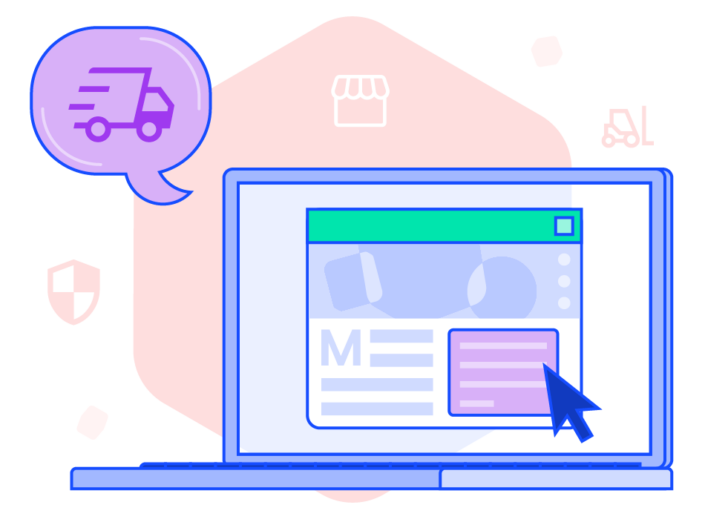![]() From 2017 through 2024, ecommerce retail is expected to double*. By 2024, there should be close to $600 billion in annual sales. This flood of digital business is forcing online businesses to scale their ecommerce technologies, growing their tech stack, and increasingly relying upon their supply chain management for their revenue production. Unfortunately, many companies are still relying upon aging, legacy systems, and the different ages of tech can make communication difficult.
From 2017 through 2024, ecommerce retail is expected to double*. By 2024, there should be close to $600 billion in annual sales. This flood of digital business is forcing online businesses to scale their ecommerce technologies, growing their tech stack, and increasingly relying upon their supply chain management for their revenue production. Unfortunately, many companies are still relying upon aging, legacy systems, and the different ages of tech can make communication difficult.
Businesses need to become more strategic about how they manage their supply chain, and start considering from scratch builds or cloud revamps to modernize their existing solutions. Here’s what you need to know about the state of supply chain technology today.
What is Supply Chain Technology?
A small ecommerce business may think that it has virtually nothing in terms of supply chain technology. But that’s not true. Supply chain technology encompasses many systems for a business:
- Logistics API Stack (including Carrier Integrations)
- Inventory Systems
- Databases
- Invoice Solutions
- Procurement Platforms
- Warehousing Solutions
- Barcode Systems
- Sensor Networks
This, unfortunately, is just technology related to supply chain – if you’re an Enterprise business selling into multiple channels, or a large brick and mortar retailer, this is just the tip of the iceberg. With most of these pieces of software requiring maintenance, updating/upgrading, the mountain of technical debt is seemingly never ending and we haven’t even started talking about other sides of the business.
Carrier integrations are undoubtedly a vital part to any supply chain tech stack as offering more shipping options to customers is more important than ever, but often times this the last thing most teams want to address. EasyPost was built with this exact thought in mind, to offload cumbersome integration work and provide a multitude of carriers at your fingertips to future-proof a business.
Ecommerce is a cutthroat space, and ruthless customer expectations around transit times, reliability, and cost make it an undeniable aspect of competition in the marketplace. When companies create their own infrastructure, it makes them less reliant upon marketplaces such as Amazon to sell digitally. It’s no secret that selling directly from a business’s eCom site helps improve margins (no middleman), but moreover this also poses the opportunity for brands/retailers to cultivate better relationships with their customers and control the CX of a brand both in-store and online.The better your supply chain tech stack is, the more a company will be able to reduce its overhead and avoid inefficiencies that traditionally slow ecommerce growth. With overhead reduced, businesses can invest more money into advertising, product innovation, and scaling for growth – feeds the cycle.
Of these, scaling is one of the most critical issues when it comes to supply chain management. Companies with weak supply chains may operate well until they reach a specific scale, but once they start to scale, their tech stack built 2 years ago no longer can keep up. Companies that want to future-proof themselves should consider scalability of a partner as a crucial factor to do business.
What Do Business Owners Need to Do to Improve their Supply Chain?
Business’s should start by evaluating if the piece of technology they are using is right for them. Many technologies are catered toward a specific customer type, industry, or size, so understanding “is my current setup optimal” is a big piece. Beyond that is evaluating if their solution is scalable for where their business is headed and how much on-going maintenance is involved. Depending the answer to these questions, a revamped or possibly custom solution might be the best option.
A from scratch solution can be a big undertaking, so hard that most major, international businesses haven’t done it yet. Whether it is a from scratch build or simply sprucing up your current setup, the value of 3rd party APIs like EasyPost are immensely valuable towards remaining relevant in the competitive ecommerce landscape. As a true “integrations partner” of sorts, EasyPost aims to be the last shipping API that a business will need to integrate to or maintain.
Apart from carrier options, savings, and offloading technical debt, a robust multi-carrier API adds ancillary value via data normalization across carriers, global address verification, and standardized tracking. Features like these that help a business analyze shipping data more easily, improve CX with better tracking, lose less packages, could be the difference between earning a customer for life and a one-time buyer in this day and age.
Lastly, with carriers embracing technology partnerships with 3rd party’s working with a platform like EasyPost is better than ever.
We live in exciting times with commerce changing before our very eyes, mobile becoming a proving ground, and social media and SEO becoming arguably more valuable than TV commercials and billboards. With DTC growing and shipping costs rising, having an ally like EasyPost is more valuable than ever. Whether it is international expansion, same-day/next-day support, ship-from-store, drop-shipping or anywhere in between – EasyPost can help with that.
Do you have questions about shipping APIs for ecommerce? Let’s talk.



